(LDXH) On June 2nd, the Ministry of Labour-Invalids and Social Affairs (MOLISA) held a Conference with business enterprises about current situation of Labour laws’ enforcement. Deputy Minister Pham Van Huan is preside of the meeting. Some Government Departments also attended the Conference: Legal Department, the Department of Social Insurance, the Department of Employment, Ministry Inspectorate,….
At the opening of Conference, Deputy Minister Pham Van Huan said that MOLISA has held many Conferences with business enterprises to discuss about the enforcement of Labour policies for recent years. During the implementation progress, so many problems arose with the companies such as overtime hours of employees… After the publishing of Law Code, Congress has enacted other Law such as Employment Law, Career education Law, Occupational safety Law,…. to generally complete documents of Law systems, in order to expand and improve working conditions for employees. However, these Laws put pressure on business enterprises about cost rising on insurance premiums. In this Conference, all the recommendations of business firms would be recorded and given to the Government to consider further change in law documents. The Labour Code is expected to be edited in 2017, therefore, Mr. Huan hoped that all business enterprises in this Conference would reflect their difficulties and obstacles during the implication of labour policies for further improvement in business growth, job creation and international integration.
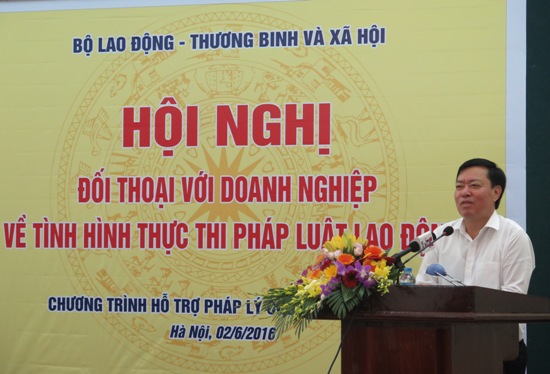
Deputy Minister Pham Van Huan is speaking at the opening of the Conference.
Since Law Code was enacted, there were about 60 documents about law details and guidelines. With this amount of legal documents, delegates said that the system of labour registration is relatively complete. For example, the legislation of recruitment of foreign labour was stipulated in Decree 11/2016 / ND-CP, in which the enterprises will consider their demand of foreign labour annually, then report to provincial People’s Committee for permission. In another case, if the companies want to recruit and sign contract with foreign workers, they have to send copies of signed contracts to MOLISA.
Besides that, Ministry of Labour - Invalids and Social Affairs has also issued Circular No. 47/2015 / TT-MOLISA. According to this Circular, before recruiting a new employee, the employer has to directly sign one of four employment contracts with the new member. At the third time of contract signing, the contract must be turned into Indefinite duration employment contract or 24-month employment contract (in case the previous contract is fixed term or less than 12 months.)
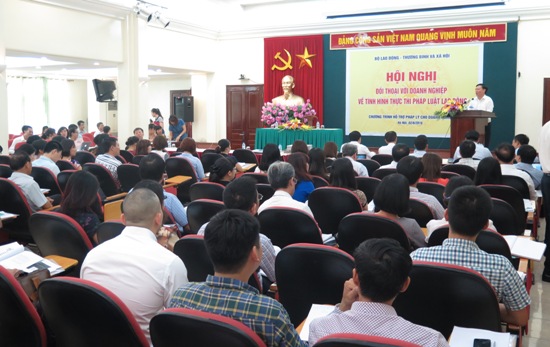
All representatives at the Conference.
According to Social Insurance Law in 2014, from January 1st 2018, all people who work under employment contract from 1 to 3 months must register to compulsory social insurance. In details, the rate of compulsory social insurance is 18% for the enterprises, 8% for the employees; the rate of unemployment insurance is 1% for both companies and workers, maximum 1% for the Government; the rate of medial insurance is 3% for companies, 1,5% for the employees.
In June 25th 2015, the National Assembly passed the Law on Labour safety and hygiene to solve problems related to workers who suffered from occupational accidents and diseases. This law mentions about the responsibilities of employers and treatment policies with wounded or sick employees at work place. Moreover, it is said that the employees cannot claim compensation from the employers if they hurt themselves or destroy their health intentionally, which concludes using drug or forbidden substance.
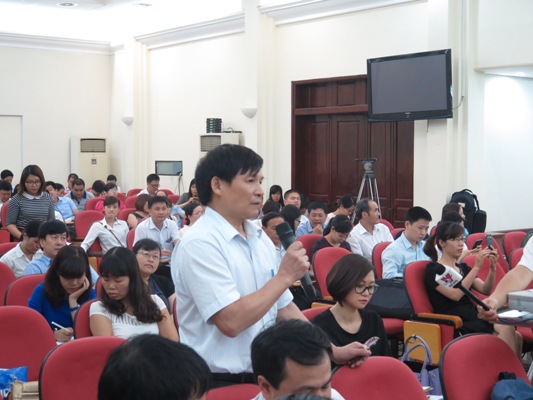
Representative of textile enterprises is discussing about labour policies.
Although the legal system is enacted a lot, many delegates were confused that Labour Code and details documents basically did not meet the requirements of international labours standard. According to the Legal Department and MOLISA, in some free trade agreements that Vietnam has joined recently as Vietnam – EU Agreement, TPP Agreement,…., the labour issue and the content of the agreement is often based on international labour standards which were defined in the basic 1998 ILO Declaration. This declaration is on fundamental principles and rights workplace standards including 4 groups: freedom of association and collective bargaining rights based on criteria defined in Convention No. 87 and Convention No. 98; Elimination of all forms of forced labour based on the criteria defined in Convention No. 29 and Convention No. 105; Elimination of the worst child labour forms based on the criteria defined in Convention No. 138 and Convention No. 182; Elimination of discrimination at work based on the criteria defined in Convention 100, Convention No. 111. Thus, if comparing with international labour standards, the basic Labour Code and the detailed regulations did not meet the requirements of international labour standards regularly.
After listening to all of recommendations from delegates at the Conference, the Ministry should actively develop and complete legal system to meet the international standard and catch up with the integration progress.
N.Ngoc.
Translated to English by Minh Ngoc.
-
 Minister Dao Ngoc Dung received the ASEAN’s General Secretary
24-04-2024 10:38 35
Minister Dao Ngoc Dung received the ASEAN’s General Secretary
24-04-2024 10:38 35 -
 Ha Nam province promotes career orientation for students
23-04-2024 14:28 49
Ha Nam province promotes career orientation for students
23-04-2024 14:28 49 -
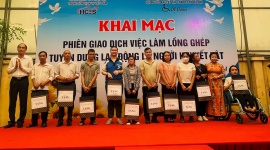 Hundreds of job opportunities for people with disabilities in Hanoi
17-04-2024 10:22 29
Hundreds of job opportunities for people with disabilities in Hanoi
17-04-2024 10:22 29
-
 Minister Dao Ngoc Dung received the Chairman of the Korea International Cooperation Agency
21-03-2024 14:14 48
Minister Dao Ngoc Dung received the Chairman of the Korea International Cooperation Agency
21-03-2024 14:14 48 -
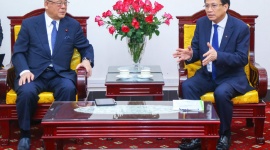 MoLISA proposing Japan to expand occupations to receive Vietnamese workers
18-03-2024 11:12 55
MoLISA proposing Japan to expand occupations to receive Vietnamese workers
18-03-2024 11:12 55 -
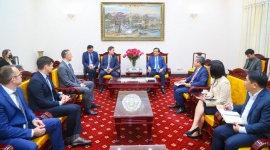 Promote labour relations between Vietnam and Hungary
18-03-2024 09:55 15
Promote labour relations between Vietnam and Hungary
18-03-2024 09:55 15








